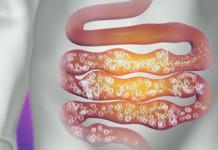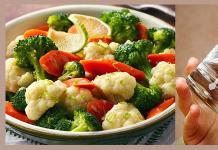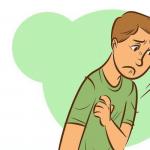Otherwise, in medicine it is called flatulence. Excessive accumulation of gases in the intestines, as a rule, indicates a violation in the work of the digestive system itself or the development of certain diseases. Many constantly put off a visit to the doctor and are even embarrassed by flatulence, attributing it to malnutrition. However, such a problem should not be ignored. In this article, we will look at the main causes and symptoms of gas in the intestines, as well as the recommended treatments for this pathology.
general information
Flatulence refers to the excessive formation of gases in the intestines due to a violation of the digestive process. Increased gas formation, as a rule, is observed when eating foods rich in fiber, or overeating. It is these factors that disrupt the usual work of the digestive tract.
According to experts, normally in the body of an absolutely healthy person there is about 0.9 liters of gases that are produced by various microorganisms. During the day, only 0.1-0.5 liters of gases are excreted from the intestines. With flatulence, these figures increase to the mark of 3 liters. Involuntary emission of fetid gases is most often accompanied by characteristic sounds. "Exhaust" is formed from five components: oxygen, carbon dioxide, nitrogen, methane and hydrogen. The unpleasant odor is associated primarily with sulfur-containing substances, which are produced in large quantities by bacteria in the large intestine. You can deal with this problem and forget about it forever. To do this, you need to know why gases are formed in the intestines.
Causes
Treatment of this pathology may be ineffective if you do not know which factors provoked its development. The accumulation of gases in the intestines is observed due to the following reasons:
- Eating foods rich in starch or fiber, as well as milk.
- Violation of the process of digestion of food.
- Changes in the normal intestinal microflora (dysbacteriosis) due to the intake of certain groups of drugs.
The reason for the occurrence of gases in the intestines often lies in the violation of their movement through the organ itself and the removal to the outside. Most often, this situation occurs with various kinds of infections, when various toxins directly affect the intestinal muscles themselves.

Causes of a psychological nature
Many do not believe in the healing power of thought. However, modern medicine can provide a large amount of evidence when a person was cured solely due to the desire to be healthy.
Of course, thoughts can have the opposite effect. The worldview of a person, in particular his negative attitude, often affects the development of a particular disease. What can cause gas in the intestines? The causes of this problem from the point of view of psychosomatics, we will consider below.

According to experts, any of the above factors can be eliminated if desired. It is positive thoughts that often help to overcome strong gases in the intestines.
Reasons of a psychological nature are far from always the fundamental factor leading to the development of this pathology. However, lately they are increasingly reminding of themselves. If a person changes his thoughts, you can see how the general condition of the body improves. The thing is that the body is a reflection of our inner world.
Symptoms
- Cramping pains in the abdomen, constant feeling of fullness, discomfort.
- Belching.
- Bloating.
- Rumbling resulting from the constant mixing of the contents of the stomach itself and gases.
- Constipation or diarrhea.
- Nausea.
- Flatulence.

Common symptoms are usually manifested in the form of a rapid heartbeat, a burning sensation in the chest. Patients often complain of insomnia. It occurs as a result of depression and intoxication of the body.
What diseases are accompanied by flatulence?
Above, we have already listed the main factors that cause excessive formation of gases in the intestines. The causes of pathology do not always lie literally on the surface. Doctors distinguish a number of diseases accompanied by flatulence, that is, in this case, increased gas formation acts as a symptom. These include the following:
- Dysbacteriosis.
- Peritonitis.
- Neurosis.
- The presence of helminths in the rectum.

Diagnostics
When we talk about such a pathology as increased formation of gases in the intestines, the causes and its treatment are interrelated, therefore, it is initially recommended to undergo a complete diagnostic examination.
The doctor must listen to all complaints of patients, clarify the nature and duration of the problem, its features. Then nutrition is analyzed. In some cases, the doctor may ask you to keep a so-called food diary, where you will have to write down all the foods and drinks you eat.
Additionally, the following studies may be required:
- Radiography of the abdominal cavity.
- FEGDS.
- Coprogram.
- Colonoscopy.
- Sowing feces.
With chronic belching, loose stools and unmotivated weight loss, an endoscopic examination is prescribed to rule out bowel cancer.
How to reduce gas formation?
Treatment of flatulence involves complex therapy. However, it should be taken into account what exactly contributed to its occurrence. It is not recommended to start treatment on your own, without a diagnostic examination.

Symptomatic therapy, as a rule, is aimed at reducing the existing pain syndrome and involves taking antispasmodics (drugs "Drotaverine", "No-shpa").
Etiotropic therapy suppresses excess gases in the intestines, the causes of which often lie in the malfunction of the organ itself. For example, probiotics are used to eliminate dysbacteriosis, and Cerucal is prescribed to enhance intestinal motility.
Pathogenetic therapy fights flatulence by means of sorbents (Phosphalugel, Enterosgel), enzymatic preparations (Pancreatin, Mezim), defoamers (Dimethicone, Simethicone medicines).
The most popular recently is a medicine called "Espumizan". The drug has proven itself in the fight against increased gas formation, has practically no side effects, is allowed for the elderly and patients with diabetes.
How to eat with flatulence?
First of all, it is necessary to find out which foods provoke constant gases in the intestines. The reasons for this condition in some people depend on the abuse of fatty and meat dishes, while in other people - flour products and sweets.
With concern, doctors recommend treating those foods that contain a high content of fiber (legumes, black bread, citrus fruits, cabbage). It is better not to eat vegetables and fruits raw, they can be baked or stewed.

To permanently get rid of constipation and normalize bowel function, you should eat foods that contain indigestible fiber (for example, ground wheat bran). Of course, it is necessary to completely eliminate alcohol.
Doctors recommend adhering to the principles of the so-called separate nutrition, that is, not to eat starchy and protein foods together. In the diet, it is better to replace meat with a low-fat version of fish, and drink herbal tea instead of coffee.
It is very useful for the stomach to periodically arrange fasting days. They help to fully restore the digestive system and cleanse the body of existing toxins.
Conclusion
In this article, we talked about how gases are formed in the intestines, the causes of flatulence and the main ways to deal with it. In fact, this problem is of concern to many today. Do not neglect qualified help from specialists and self-medicate. Thus, you will only harm your body.
The human body is a truly unique mechanism that simultaneously performs a huge number of vital functions. One of the main systems is the digestive system. When food enters the mouth, it goes through a long process of processing. All nutritious foods are broken down into simple substances, from which the body absorbs everything it needs - acids, vitamins, proteins, fats and carbohydrates. And all unnecessary (usually fiber and other decay products of food) are excreted by the intestines. All this is accompanied by gas formation - pronounced or moderate.
Normally, the human body emits 0.3-0.5 cubic decimeters of gas, which is approximately 1-2 cups in volume. But everything is individual and depends on the nutrition and weight of the person. If the volume of gas released increases by 2-3 times, very often this brings the patient serious discomfort. A person cannot work normally - he constantly feels the urge to release gas. As a rule, flatulence is accompanied by pain in the abdomen and wild discomfort. In this article, you will learn why increased gas formation occurs, how it manifests itself, and also get acquainted with the main medications and home remedies for getting rid of flatulence.
Causes of increased gas formation
Here are the main factors that can cause a malfunction in the digestive tract and cause increased gas formation.
- Enzymes. Enzymes are substances that are necessary for the digestion of food. If there are few enzymes in the stomach, not fully digested food descends into the lower parts of the digestive tract. This leads to active fermentation processes. Enzyme deficiencies may occur after poisoning. If the deficiency of substances is observed for a long time, you should definitely see a doctor.
- Food. This is the most common reason why increased gas formation begins. Some foods are difficult to digest and enter the intestines completely unprocessed. This leads to the fermentation process and the active release of carbon dioxide. These products include legumes, pastries, unleavened dairy products, grapes, kvass, cabbage. Such products are strictly contraindicated after various operations or childbirth, precisely in order to avoid flatulence.
- Diseases of the gastrointestinal tract. Any inflammatory processes in the stomach, duodenum, liver and pancreas lead to increased gas production in the intestines.
- Dysbacteriosis. Normally, the human intestine contains a certain amount of the necessary bacteria that make up a healthy intestinal microflora. For some reason, this balance can be disturbed and the fermentation process in the intestines is activated. The microflora is disturbed after taking antibiotics, due to stress, after poisoning and other provoking factors.
- Swallowing air. Air in the intestines can appear naturally - if you swallowed it with your mouth, and it did not come out with a burp. This often happens if a person talks a lot during meals, actively smokes. Babies may swallow air while suckling at the breast or bottle.
- Perylstatics. If there are various adhesions in the intestines, circulatory disorders, tumors, if there has been a surgical intervention - this often leads to poor peristalsis - the intestines simply do not move gases to a natural exit.
- Nervous experiences. In the intestines there is a huge number of nerve endings that respond to the general psycho-emotional state of the body. After nervous experiences and stress, a person may experience increased gas formation, diarrhea or constipation.
Also, active gas emission can be observed on the tops of mountains and other elevations with low atmospheric pressure. It's all about physics - a small pressure from the outside leads to an increase in the pressure of gases inside the intestines.
Symptoms and ways to diagnose the causes of flatulence
Flatulence is not only an increased and frequent release of gases, but also a mass of accompanying symptoms. One of the main ones is bloating. Such a large amount of gas accumulates in the intestines that the stomach begins to bulge strongly, the woman becomes like a pregnant woman, at least in the third month of pregnancy. Normally, a person lying on his back should have a stomach that does not stick out above the chest. With flatulence, the abdomen is swollen and appears much further than the sternum. At the same time, a swollen belly causes a lot of inconvenience - a person feels bursting.If flatulence has overtaken in a public place, this is accompanied by a feeling of embarrassment, since the discharge of flatus increases sharply. If a person tries to restrain the release of gases, this is aggravated by rumbling in the stomach and even more bloating. Sometimes flatulence can be accompanied by pain - sharp and sharp, these are colic. If flatulence is accompanied by constipation, frequent belching, bad breath, you need to see a gastroenterologist as soon as possible.
Diagnosis of flatulence is usually limited to palpation, inspection and information gathering. Sometimes, in order to find out the causes of increased gas formation, it may be necessary to take a stool test for bacteriological analysis and a coprogram (examination of feces for the presence of enzymes). If there are mechanical obstructions to the passage of gases, they can be detected using an x-ray of the stomach. In more serious cases, hardware diagnostics may be needed - colonoscopy, laparoscopy, etc.
Here are some of the main areas in which flatulence is being treated.

- If there is an underlying disease of the stomach or pancreas, the emphasis is on its treatment in order to deal with the cause, not the symptom.
- Prokinetics are drugs that increase duodenal motility. They are often prescribed for increased gas production. These are Motilium, Metoclopramide, Tegaserod, etc.
- If necessary, the patient is prescribed enzymes for better digestion of food. These are Creon, Festal, Pancreatin, Mezim, etc.
- If the matter is in dysbacteriosis, then drugs with beneficial bacteria are prescribed. These are Linex, Bifido- and Lactobacilli, Hilak Forte, Acipol, etc.
- If flatulence is caused by poisoning, the patient is shown sorbents - activated carbon, Enterosgel, Polysorb, Filtrum, etc.
- For constipation, laxatives may be needed - Bisacodyl, drugs based on lactulose, etc.
If the exit of gases is prevented by a mechanical obstacle - a tumor or adhesions, the issue of surgical intervention is decided. It is very effective to use the drug Espumizan - it is safe and can even be used to treat children. In addition, the patient should follow a diet and eat only those foods that are well digested and do not lead to the processes of putrefaction and fermentation in the intestines.
Increased gas production in a child
Increased gas formation can be observed in children during the first months of life. Their digestive tract is still immature, there are not enough enzymes, so a huge amount of gas accumulates in the intestines, which cause pain and discomfort to babies. Colic occurs in almost every child, all parents know this. Along with teething, colic is considered one of the most difficult periods in the life of a little man.
Colic is a natural process in the development of the body's digestive system. You just need to go through this difficult period and try to alleviate it with all your might. First of all, the mother herself should refuse puffy foods if she is breastfeeding the baby. Part of the gases passes to the baby through mother's milk.
Oddly enough, but babies cannot fart - they simply do not know how to do this due to their age. They need to be helped in every possible way in this difficult task - to move their legs, to do a “bicycle” and a circular massage of the abdomen, to actively press their knees to their chest. You can facilitate the process of escaping gases with the help of a gas outlet tube. Warmth will help reduce the number of painful colic in the abdomen - attach a warm diaper to the tummy or simply press the baby to your naked body. Give the baby a decoction of dill seeds - it removes gases and reduces bloating. Usually, colic lasts for several months - after 4 months of life, they recede.
Here are some tips and recipes to help you deal with flatulence.

- Fermented milk products, cereals from millet and buckwheat, bran will help improve intestinal motility.
- In order not to overload the intestines, you need to eat often, but not enough - 5-6 times a day, the volume of one serving should not exceed 250 ml.
- Avoid legumes and coarse fiber - they increase the formation of gases in the intestines. You should also abandon products that cause fermentation - kvass, unleavened milk, raisins. Do not drink carbonated drinks - the number of "bubbles" in the intestines will only increase. It is necessary to abandon complex proteins - pork, mushrooms. They are difficult to digest and can cause putrefaction in the intestines. Fast carbohydrates are capable of provoking gas formation - give up fresh pastries, muffins, desserts. When the situation with the intestines improves a little, the diet can be loosened, but at first it should be strictly adhered to.
- Prepare an effective carminative decoction of parsley and dill. Take one bunch of each type of greens, rinse and place in a jar. Pour boiling water over and let it brew for 3-4 hours. Drink half a glass of decoction half an hour before each meal.
- The next decoction will help you calm the raging intestines after the first dose. Pour a tablespoon of dry wormwood, chamomile, yarrow and elecampane into a jar. Add a pinch of cumin. Pour a liter of boiling water over and leave wrapped for at least two hours. Drink 4-5 times a day, 100 ml of decoction. Do not forget to drink the first portion of the decoction on an empty stomach.
- Raw potato juice will help get rid of flatulence and pain in the stomach. The fruit should be grated, and the resulting pulp should be squeezed through cheesecloth. Drink a third of a glass every day on an empty stomach for about a week.
Flatulence is a normal component of the normal life of the body. Of course, you do not need to release gases in society, but you should not worry about their large number either. In some cultures, active gas formation is considered a sign of good taste. If flatulence does not allow you to live and work normally, visit a doctor, this problem is solved quite simply.
Video: how to cure flatulence
Probably, every person has experienced symptoms such as: bloating, flatulence and gas in the abdomen after malnutrition or in connection with a diet violation. But these signs can also manifest themselves in the form of dyspepsia. As a rule, this is caused by improper stomach motility or a violation of the digestive process, from which food stagnates in it, thereby causing a feeling of fullness, fullness and other symptoms.
Gas in the stomach, causes
Gases never form on their own! This happens when a person, when eating food, is talking with an interlocutor, and during this, he swallows air. What are gases? It is a compound of methane, hydrogen, nitrogen, oxygen and carbon dioxide. They do not have a specific smell. An unpleasant smell is the result of the vital activity of bacteria that inhabit the intestines.
The only way to get rid of gas is by belching, incomplete absorption into the blood duct and excretion through the rectum (farting). This discomfort can disrupt all activities for a long time. Immediate outside intervention is needed to rectify the situation. But first you need to find out the true cause of the accumulation of gases in the intestinal tract and suggest a further scenario for preventive measures.
The formation of gases in the abdomen is a natural physiological process
Excessive accumulation of methane, or a violation of their removal from the body leads to flatulence. It is a whole lot of inconvenience, especially when it happens at a party or in public transport. People immediately begin to whisper and look askance. If these problems are persistent, it is necessary to consult a specialist and take the drugs prescribed by him. Only in this way will it be possible to solve the current problem. Of course, the appearance of gases in the stomach is not a reason to rush to the doctor, but in the current case, it is simply an inevitability.
Factors affecting gas formation:
- First of all, this reason should be singled out - overeating and excessive swallowing of air.
- High content of carbohydrates and fiber in consumed foods.
- stressful situations.
- Low productivity of enzymes and hormones in the digestive tract.
- Intestinal pathologies.
In addition to flatulence, distension of the abdomen, other symptoms may also be disturbing. For example, nausea, belching, retention of feces or, conversely, diarrhea, as well as spasmodic pain in the abdomen. In order to eliminate discomfort, in some cases it is enough to switch to a healthy diet. That is, exclude foods that are rich in carbohydrates and fiber, as well as refuse drinks that initiate fermentation. Plus, don't overeat. A person is obliged to eat about five times a day in small parts than three large ones.
ATTENTION! If using simple methods it is not possible to normalize the condition, and besides, the problem is growing like a snowball, it is necessary to use alternative medicine or pharmaceutical drugs. The paramount importance of the patient is to eliminate by all possible means toxins and harmful compounds from the body. If it is not possible to cope with the problem on your own, seek qualified help. But since modern people have now become literate, this information can be found in the public domain. The main thing is to carefully follow the instructions and know the reaction of your body to a particular remedy.
The main causes of gas formation:
Food
- diet food;
- condiments, breakfast cereals, dairy products;
- beans, bran, flakes;
- pears, peaches, cabbage;
- onions, potatoes;
- highly carbonated and intoxicating drinks.
Products with a high content of starch, chitin, lactose, sorbitol, and sucrose have a similar effect. Constant gas formation in the abdomen is formed during the breakdown of fiber and complex carbohydrates.
Food Enzymes
In connection with some problems of the peptic system and the intestinal tract, low enzyme productivity is diagnosed for the proper breakdown of food. Due to an unbalanced process, food becomes acidic and this also contributes to the formation of gases.
Binge eating
Basically, this habit is abused by people who until today do not know that the flora of the stomach has a conditioned number of beneficial bacteria that take part in digestion. Against the background of the pathology of this balance between healthy microorganisms and the food consumed, flatulence appears.
bowel problems
Disorders such as helminths, malignant tumors, stony stools prevent the "exhaustion" of gases. To identify them, the patient will need to undergo a colonoscopy or magnetic resonance imaging.
Decreased bowel activity
When its peristalsis slows down, the motility of the intestinal walls, which are responsible for the excretion of processed food, weakens, respectively, this functionality is disturbed. As a result of this, food stagnates, acidifies, the fermentation process is activated, which leads to the appearance of gases in the stomach.
Improper food intake, along with which oxygen is swallowed
The methanes formed because of this are able to be thrown back from the intestines. There is belching and gas in the abdomen. This is often diagnosed after a stroke.
Stress, prolonged depression
How can this affect gas formation? Everything is quite simple - because of the spasm of the smooth intestine, gases are formed in the stomach. But since such situations often occur in life that cannot be predicted, it is worth trying to drink soothing teas, decoctions, vitamin complexes to strengthen the nervous system.
Practically any violations occurring in the body serve as provocateurs of flatulence. But, first of all, it depends on the individual characteristics of the intestine and on the amount of gases it absorbs.
The symptoms are:
- the release of an unpleasant odor from the rectum up to 10 times a day. This diagnosis is referred to as - "flatulation";
- due to the formation of toxins in the intestinal tract, undigested food, a feeling of nausea appears;
- due to the stretching of the walls of the intestine during the accumulation of methane, there is pain in the abdomen;
- rumbling in the abdomen.
In addition, a person is taken out of a measured rest by rumbling, frequent belching, constipation or diarrhea.
How and what to treat?
At first glance, it seems to many that flatulence is a trifling disorder that is unable to harm the body, and, in general, does not deserve any attention on their part. So, you should know that the symptoms caused by flatulence give rise to other problems. Among them can be distinguished - rapid heartbeat, arrhythmia, burning sensation. The appearance of gases in the stomach and constant worries about this problem for what is happening leads to depression, and efficiency decreases. In general, it affects overall health in general. Therefore, in order to prevent this, it is necessary to solve the problem as it arrives, then nothing can overshadow life.
If nothing serious, in addition to flatulence, is expected, experts suggest that the patient switch to diet food, which they make up taking into account all the analyzes and health indicators at the moment. Alternative therapy can also be prescribed to quickly remove excess gases from the body.
After diagnostic and clinical studies, in cases of serious suspicion, medical intervention is recommended. The attending physician will also tell you about this. Just do not hesitate to contact him for help with this delicate problem.
Gas in the stomach: how to deal with them?
Eliminating bloating involves a complex process that may involve identifying and eliminating the root cause. If, for example, gases appear in the stomach from beer, then you do not need to drink it. And, in general, alcoholic beverages have never benefited the body, only harm with possible side effects (disorder of the nervous system, for example).
Changing the habitual way of life
Poor dietary hygiene is a common cause of bloating. You need to have breakfast, lunch and dinner in a calm environment - do not rush anywhere, chew food thoroughly, do not talk to anyone, do not be distracted by TV, etc. e. Also a positive point in getting rid of gases in the intestines will be a complete cessation of smoking. During smoking, with each puff of a cigarette, the body enters air, which has already been discussed in this material. Therefore, we will not repeat ourselves, but move on to the next paragraph.
Correction of daily diet
As a rule, when specialists prohibit harmful products, patients increasingly begin to abuse them. Therefore, a complete taboo will not be described here, we will indicate only a few food products for the reader's awareness. These include - whole milk, muffins, potatoes in all forks, sweets, confectionery, cabbage and the like. Fractional nutrition contributes to the normalization of the digestive process and the treatment of increased accumulation of gases in the intestines. So, a day people should eat 5-6 times not in large portions. It is desirable that each time the food is freshly cooked and not subjected to repeated heat treatment. This applies not only to people prone to addictions, but also to quite healthy people who are not indifferent to the work of the whole organism.
Medications
The most common and available today are:
- Mezim-forte. By the way, it can be taken as a prophylactic when consuming an unusual or high-calorie dish. It is allowed to drink sweet drinks, and even simple tea, this will not affect the performance of its functions. This drug costs differently everywhere, and if you are interested, you can go to any official pharmacy website and get acquainted with the prices;
- Espumizan. Adults are more likely to use tablets than an emulsion, because the second is more convenient to give to children. Before use, read the instructions;
- Hilak-forte. This drug, getting into the intestinal tract, destroys the accumulated gases and removes them through the rectum;
- Smecta. Its use on the road is not very convenient, since it is sold in powder form. There is a need to pre-diluted it in water;
- Motilium. These pills are probably already familiar to everyone, so it does not make much sense to describe them.
Prevention - do fasting days once a week, do not overeat and exclude foods that provoke gas formation. The remaining recommendations will be announced by a specialist during a personal visit.
Gases in the intestines are a normal physiological process in the body of any person. Increased gas formation () is not a sign of any serious pathology in the body, but requires treatment, as it causes severe discomfort and indicates the first disturbances in the digestive organs (esophagus, stomach, intestines).
Physiology
Flatulence is a widespread phenomenon in which an excess of gases accumulates in the intestines.
This can be felt by an absolutely healthy person when overeating, eating foods rich in plant fiber. Excess accumulations of gases in the intestines are obtained as a result of a violation of the ratio between the formation and removal of gases. They enter the intestines from the air swallowed by a person into the stomach, gas released from the bloodstream and from the caecum.
Normally, the release of gases occurs in humans up to 25 times a day. They are odorless. An unpleasant odor is a consequence of compounds such as indole, skatole, hydrogen sulfide. They are decay products during the interaction of intestinal microorganisms with undigested food residues that enter the large intestine from the small intestine.
Gases in the intestine are multiple small bubbles covered with viscous mucus. Their content in large quantities complicates digestion, absorption of nutrients and reduces the activity of enzymes.
Causes
In medicine, several types of increased gas formation in the intestines are distinguished, each of which has its own reasons:
- alimentary - physiological causes associated with the ingestion of the stomach, along with food, a large amount of air, as well as the use of foods excessively rich in fiber;
- digestive - increased accumulation of gases in the intestine occurs against the background of an insufficient level of enzymes. In rare cases, the process can proceed as a result of a violation of the circulation of bile;
- dyspiotic - flatulence occurs due to a violation of the normal ratio of beneficial and pathogenic microflora in the intestine;
- mechanical - when malignant or benign neoplasms form in the large intestine, they make the intestinal lumen narrower, causing problems with normal gas exchange;
- dynamic - in case of serious pathologies (peritonitis, intoxication of the body with feces in acute obstruction, with abnormalities in the development of the intestine), the formation and removal of gas from the intestine is difficult and slows down;
- circulatory - flatulence manifests itself against the background of improper functioning of the circulatory system.

The causes of gases in the intestines are also more commonplace, among them:
- smoking - along with tobacco smoke, a smoker at the level of reflexes draws in a large amount of air;
- poor chewing of food;
- drinking large amounts of highly carbonated drinks;
- surgical interventions;
- stressful situations;
- taking strong antibiotics.
Symptoms
The most common symptoms of increased gas production that cause discomfort include:
- a feeling of fullness in the intestines, bloating;
- in rare cases, mild pain of a single or permanent nature is possible, occurring in the stomach and esophagus, mainly after eating;
- acute pain - a strong accumulation of gases in the intestine, stretches its walls, a reflex spasm is formed and, as a result, pain;
- rumbling in the abdomen - occurs when a large amount of gas is mixed with the liquid part of the contents of the intestine;
- frequent belching - occurs due to dysphagia (a disorder of the act of swallowing, in which a person swallows a large amount of air) and the reverse flow of gas from the stomach. Belching is a natural physiological process. But if it is accompanied by an unpleasant odor and pain, this may indicate some disorders in the digestive system;
- or - violations of the act of defecation is always accompanied by increased gas formation;
- nausea is a rare and not entirely characteristic symptom that may indicate digestive disorders and, as a result, the content in the large intestine of a large amount of toxins and the remaining particles of undigested food;
- feeling of discomfort after eating: heaviness;
- splenic flexure syndrome - flatulence occurs due to the rare anatomical structure of the intestine. The left flexure of the colon is located high under the diaphragm and is an obstacle to the free passage of gases. The syndrome is dangerous for its symptoms, which are often confused with the manifestation of heart failure, since this structure of the intestine causes severe pressure and pain in the chest area.
- flatulation - gases leaving through the rectum have a strong, unpleasant odor. Normally, such episodes occur 15 to 20 times a day.

Symptoms of gas in the intestines can appear constantly or intermittently after eating certain foods. It is characteristic that discomfort and discomfort disappear after the discharge of gases or the act of defecation.
Signs of flatulence more often and brighter manifest themselves in the afternoon, when all systems and organs are working at full capacity. Given that the symptoms of flatulence are not specific, depend on many factors and are very often combined with more serious intestinal pathologies, further treatment depends on the characteristics of the person's diet and a thorough examination.
Diagnostics
When the patient complains of severe discomfort and frequent pain, the gastroenterologist conducts a general examination to exclude possible existing pathologies or abnormalities in the work of the stomach, esophagus and intestines, as well as to determine the causes of flatulence. The following diagnostic methods are used:
- - taking feces for analysis, which allows you to detect a lack of enzymes responsible for the digestive process;
- analysis of feces for dysbacteriosis - to identify possible disorders in the intestinal microflora.
- x-ray of the intestine - to identify possible pathologies in the form of mechanical obstacles that prevent the movement of food, feces and gases in the intestine.
- colonoscopy - is prescribed to examine the colon and identify pathologies of varying degrees.

Features of treatment
How to get rid of gases in the intestines, if no diseases and abnormalities have been identified? In this case, the specialist can prescribe both the intake of special drugs and the adjustment of the diet.
Medical therapy
The following types of drugs are prescribed:
- , - preparations containing digestive enzymes. With their lack in the body, food particles are not digested properly, but decompose, causing the formation of a large amount of gases in the intestines for their processing;
- , vigetarin - prescribed to improve motor skills;
- prebiotics:, hilak forte - preparations containing dietary fiber, which are an environment for the reproduction of native intestinal microflora;
- probiotics: linex, bifiform - products with a high content of live strains of microorganisms. They produce beneficial bacteria and populate the intestinal mucosa with them;
- prokinetics:, - are indicated to stimulate the passage of food boluses through the esophagus. They help to reduce the activity of bacteria and the formation of gases by them;
- , - absorbents prescribed to absorb excessive amounts of gases;
- antispasmodics: no-shpa, drotaverine - are prescribed to relieve severe pain with prolonged flatulence.

Diet
It helps to get rid of gases in the intestines - this is part of conservative therapy and the best way to prevent increased gas formation in the intestines. The menu should include products that not only provide a full-fledged complex of vitamins and trace elements, but also stimulate intestinal motility, reduce fermentation processes and restore its normal microflora.
Basic rules for eating with flatulence:
- Frequent meals, but in small portions (200 g each) up to 5-6 times a day. This allows the body to quickly break down foods, and the intestines to absorb the necessary trace elements and remove the remaining dietary fiber, preventing their decay and fermentation.
- Excessively hot and cold foods are best avoided from the diet, as they increase the secretion of gastric juice and contribute to intestinal irritation.
- You can not eat products that are incompatible with each other: salty - sweet, food enriched with coarse vegetable fiber and milk. Such a complex increases the load on the digestive tract and provokes increased fermentation.
- All dishes are best consumed boiled, stewed, steamed or baked, in order to maximize the sparing effect on the digestive system.
- The salt content in cooked meals should be limited so as not to provoke irritation of the mucous membrane of the stomach and intestines.
- It is necessary to drink a sufficient amount of liquid: 1.5-2 liters per day (at the rate of 25 ml per 1 kg of a person's weight of clean drinking water without gas). It also prevents fermentation processes and ensures the timely removal of feces from the body.

Prohibited products
Prohibited foods include food that increases increased gas formation in the small or large intestine:
- foods containing a lot of vegetable fiber: apples, beans, beans, peas, broccoli, radishes, nuts;
- drinks and meals containing a large amount of carbohydrates (lactose, fructose, sorbitol, raffinose). Decaying in the body into small particles, they provoke the decay of food masses. These include: kvass, beer, highly carbonated flavored drinks, milk, ice cream, etc.;
- products containing in their composition substances that irritate the mucous membrane of the digestive tract and intestines: essential oils, preservatives, food additives;
- high starch vegetables: potatoes, corn, wheat.
A balanced menu for flatulence, first of all, should consist of dishes that do not stimulate increased gas formation, but normalize stools and gas discharge:
- wheat bread, wheat flour crackers;
- steamed poultry meat;
- low-fat varieties of fish;
- fresh greens;
- fermented milk products containing beneficial bifidobacteria;
- natural green tea without flavorings;
- cereals on the water: oatmeal, buckwheat, rice;
- scrambled eggs.

Folk remedies
Gases in the intestines - how to get rid of discomfort with the help of natural herbs and medicinal plants?
To relieve discomfort and pain
4 tbsp. l. red rowan berries (can be replaced with 1 tablespoon of dill seeds), 3 tbsp. l. mint and the same amount of valerian mix. 1 st. l. herbal collection pour 1 tbsp. steep boiling water and leave for at least 60 minutes, tightly covering the dishes with infusion lid.
The decoction is drunk on an empty stomach, 100 ml 2 times a day 30 minutes before a meal.
The course of treatment of gases in the intestines is 14 days. To relieve discomfort and pain, the decoction can be taken at the same time.
With severe bloating
1 st. l. dry chamomile, pour 200 ml of freshly boiled water, close the lid, wrap with something warm and leave for 30 minutes. Drink 100 ml of the prepared broth twice 30 minutes before meals. The decoction can be used with a feeling of severe bloating for the purpose of prevention at the same time or drink a course of 20 days. Every day a new infusion is prepared.

For the prevention of flatulence
2 cloves of garlic, 1 tbsp. l. salt, a pinch of dill (fresh or dried) and 5 leaves of black currant chop. The resulting mixture pour 1 liter of hot boiled water and leave to infuse for 24 hours in a warm place. The finished drink is drunk on an empty stomach every morning, 100 ml.
Every person has gas in their gastrointestinal tract. And each person needs to somehow remove their excess from the body. Although this procedure is completely normal and necessary for the proper functioning of the body, social restrictions make the life of people with increased gas formation full of embarrassment and social disapproval. Understanding the causes of increased gas formation in the intestines will help get rid of the symptoms of flatulence and thus allow both the sick person and the people around him to lead a more comfortable life.
On average, a person's intestines contain about 200 ml of gas. Gas can leave the body in two ways - through the mouth (belching) and the anus (release of gases). By the way, the smell of intestinal gas leaving the body through the anus is explained by the content of sulfur and organic compounds such as skatole in it. The more of them, the stronger the smell, the more unpleasant the increased gas formation in the intestines.
Causes of increased gas formation in the intestines
Generally, air enters the digestive tract in three ways: when swallowed, through the blood, and when bacteria living in the colon break down substances found in certain foods. The more air is swallowed and the consumption of those same products, the more gases in the intestines.
Swallowing air. Everyone swallows some air (usually a small amount) when eating or drinking. Usually more air enters the body if a person chews gum, drinks carbonated drinks, eats quickly, swallows food in large portions, smokes, likes to suck on hard candy, wears loose dentures. Swallowed air is expelled from the body by belching or makes a long journey through the intestines and exits at the other end.
Bacteria that live in the intestines. The human stomach and intestines are not able to independently process some substances (sugars, starches, fiber) contained in food. This requires the help of bacteria. Undigested carbohydrates pass from the small intestine to the large intestine, where bacteria are taken as treats. They break down these carbohydrates, and in the process of absorption, they release gas.
Products that promote increased gas formation in the intestines
- Vegetables: asparagus, artichokes, beans (black, white), cabbage (broccoli, Brussels sprouts, cabbage, cauliflower), beans, mushrooms, onions.
- Fruits: apples, pears, grapes, peaches, gooseberries.
- Cereal products: bran, whole grain wheat.
- Dairy products: cheese, yogurt.
- Finished products: bread, cereals.
- Juices: apple, pear, grape.
- Dairy products: milk.
- Ready drinks: carbonated drinks, kvass, beer, drinks containing fructose.
- Sweeteners: sorbitol, mannitol, xylitol.
- Dietary Supplements: Soluble fiber such as inulin.
Diseases that cause increased gas formation in the intestines
Some diseases can lead to increased gas formation or high sensitivity of the intestines - then a person, even with the usual content of gases in the intestines, will be disturbed by unpleasant sensations.
Bacterial overgrowth syndrome. With this violation of the intestinal microflora, either there are too many bacteria, or they are replaced by bacteria of a different type. More bacteria equals more gas, and too much can lead to severe diarrhea or weight loss. Most often, bacterial overgrowth syndrome is caused by other diseases. Treatment consists in the treatment of the disease that caused the syndrome.
Irritable Bowel Syndrome. This is a group of symptoms including pain, discomfort in the stomach and intestines, and changes in gastrointestinal motility; as a rule, all these symptoms are present at the same time. Irritable bowel syndrome can affect the movement of gases through the intestines. Also, a person may feel discomfort with the usual amount of gas due to the hypersensitivity of the walls of the gastrointestinal tract caused by irritable bowel syndrome. Treatment for irritable bowel syndrome is based on symptoms.
Reflux esophagitis, or gastroesophageal reflux disease. This is a chronic disease that occurs when the contents of the stomach back up into the esophagus. People with reflux esophagitis often suffer from belching.
The inability of the body to absorb certain substances. When the human body is unable to process certain foods, flatulence and bloating can occur. Human food intolerances are as follows:
Lactose intolerance. Due to the lack of an enzyme needed to process the lactose contained in milk, after eating dairy products, a person may suffer from bloating, increased gas formation in the intestines, diarrhea, and vomiting. It is impossible to cure congenital intolerance, it remains only to stop the symptoms while observing the diet.
Malabsorption (impaired absorption) of fructose. In some people, the intestines are not able to absorb fructose in full, which leads to an increase in its content in the intestines and thereby contributes to the development of diseases. Symptoms of fructose malabsorption are abdominal pain, bloating, flatulence.
celiac disease This is an immune disorder in which the human body does not tolerate gluten (gluten) - a protein found in the grains of certain cereals (wheat, rye, barley). In celiac disease, gluten damages the lining of the small intestine; also in people suffering from it, the absorption of other substances (vitamins, iron, calcium, etc.) is disturbed. Symptoms of celiac disease are severe abdominal pain, constipation, anemia, fatigue, joint pain, mouth ulcers, and weight loss. Treatment of a congenital disease is impossible. To get rid of symptoms and feel good, you will need to follow a diet for the rest of your life.
Diseases of the gastrointestinal tract. This includes adhesions, hernias, and serious illnesses that can lead to bowel obstruction, such as colon cancer or ovarian cancer. Treatment depends on the specific disease.
Symptoms of increased gas formation in the intestines
The most common in adults are belching, winds, bloating, discomfort or pain in the intestinal area. As a rule, the degree of manifestation of symptoms depends on the individual reaction of the body to drugs or foods.
Belching. After eating, many people feel the urge to burp, thereby releasing gas from the gastrointestinal tract. This is completely normal. But if a person feels the urge to burp too often, he may be swallowing too much air.
winds. On average, people feel like emitting winds about 13 to 21 times a day.
Bloating. A person feels that his stomach is full, swollen and tense. Most often, bloating occurs during or after a meal. Bloating can occur even in perfectly healthy people with excessive consumption of foods that cause increased gas formation in the intestines.
Pain or discomfort in the abdomen. When gases move through the intestines, a person may feel pain, sometimes quite severe.
Do I need to see a doctor with increased gas formation in the intestines?
Yes, you should talk to your doctor if you have a lot of gas or other gastrointestinal symptoms such as constipation, diarrhea, weight loss.
Diagnosis of the causes of increased gas formation in the intestines
To make a diagnosis, the doctor interviews and examines the patient. If he thinks that some disease is the cause of increased gas formation in the intestines, he may suggest that the patient undergo additional studies.
The doctor will ask questions about the symptoms that accompany increased gas formation, the patient's eating habits (composition, quantity, time of intake, etc.), whether the patient is taking any medications or nutritional supplements, and whether he suffers from any diseases and What illnesses did you have in the past?
The doctor may also ask the patient to keep a food diary in which to note what kind of food the patient ate and what symptoms it caused. So you can identify products that contribute to the increased formation of gas in the patient's body. Keeping a diary will also help the doctor find out if the patient is prone to increased gas formation in the intestines or is more sensitive to its usual amounts.
Physical examination of the patient. In this case, the doctor usually palpates the abdomen, determining the presence and degree of swelling. Can listen to the sounds of the patient's abdomen with a stethoscope. Also lightly taps on the abdomen to identify areas that cause pain.
How to get rid of flatulence: treatment of increased gas formation
If increased gas formation is one of the consequences of diseases of the gastrointestinal tract, their treatment should first of all be started. If the cause of increased gas formation is not a disease, but bad habits and diet, then the following will help get rid of flatulence.
Swallow less air. If you eat more slowly, don't chew gum, don't suck on hard candy, and don't use a straw when you drink, then less air enters the body. If the patient wears dentures, it is recommended to see a dentist to check if they are fitted correctly. All these measures will help reduce belching. By the way, if you chat with friends while eating, this also contributes to the swallowing of air.
Quit smoking.
Change your diet. The doctor may suggest that the patient eat more often, but in smaller portions, and reduce foods that contribute to increased gas formation in the diet.
Take medication. Some over-the-counter medications can help reduce gas buildup in the digestive tract. These include infusions of dill seeds, cumin, fennel. You can also take absorbents (such as activated charcoal), which can reduce the amount of gas in the intestines. Before starting the use of drugs or the use of traditional medicine, it is recommended to consult a doctor.
Nutrition with increased gas formation
You can cure flatulence and reduce the amount of gas in the gastrointestinal tract by reducing the amount of foods (or completely stopping them) that cause increased gas formation. This includes:
- Carbonated drinks, drinks that promote the development of fermentation reactions (kvass, beer).
- Fried foods and foods high in fat.
- Products with a high content of coarse fiber. It is recommended that you first greatly reduce the use of such products for several weeks, and then reintroduce them into the diet in small portions, monitoring the reaction of the body and the amount of gases in the intestines.
- Foods high in sugar.
If the patient is diagnosed with celiac disease, the doctor will recommend a gluten-free diet. As soon as a person with celiac disease stops taking gluten-containing foods, he immediately feels relief.
With lactose intolerance, it is accordingly recommended to refuse milk and dairy products.
If you have irritable bowel syndrome, your doctor may suggest that you try a special FODMAP diet. This abbreviation is derived from the combination of "fermentable oligo-, di-, monosaccharides and polyols" - short-chain carbohydrates that are difficult to digest by the human body and lead to an increased amount of gas in the intestines. With this diet, it is recommended to avoid foods such as cereals, garlic, leeks, legumes, milk, fruits (apples, pears, cherries, apricots, nectarines, etc.), as well as mushrooms, cabbage (cauliflower and white), and confectionery with sweeteners.
How helpful was this post?
Click on a star to rate it!
Submit Rating



















